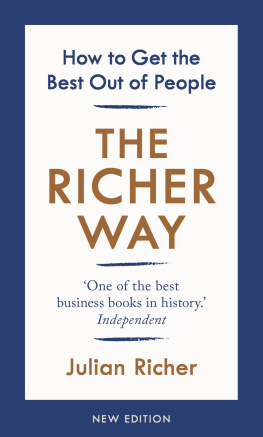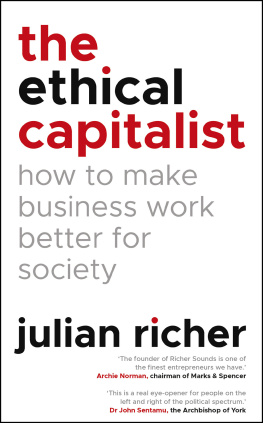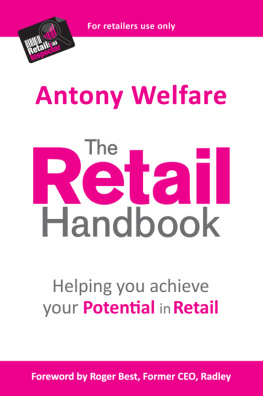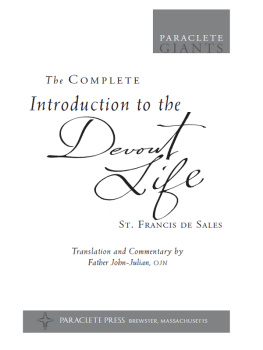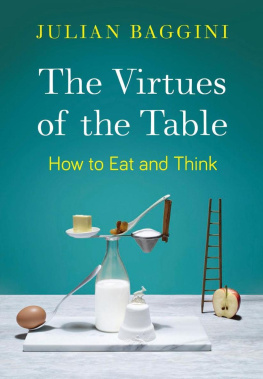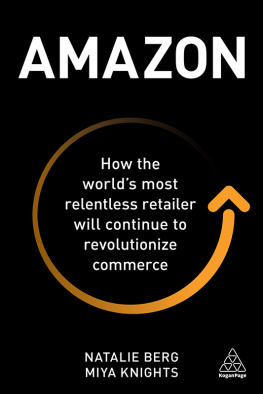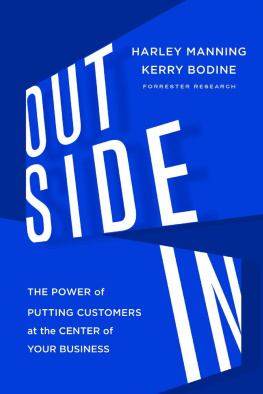Contents
About the Book
In 1978 Julian Richer, then aged just nineteen, opened his first shop near London Bridge. For over twenty years this shop has been listed in Guinness World Records as having the highest sales per square foot of any retail outlet in the world, and Richer Sounds as a whole, with its fifty-three stores nationwide and huge online presence, has become Britains favourite retailer of TV and hi-fi equipment. What lies behind this extraordinary success?
For Julian, the answer is simple: throughout his career he has focussed relentlessly on putting people both staff and customers right at the centre of his business. And in The Richer Way, he offers a supremely practical guide to how others can follow suit. He explains how to motivate employees and measure their progress. He establishes how to balance company discipline with individual autonomy. He explores what customer service should really involve. Above all, he points the way to creating an open, friendly and flexible culture that will not only attract the best people but also offer the greatest chance of business success.
Packed with straightforward, common-sense advice, The Richer Way will prove essential reading for all organisations, whatever their nature and size.
About the Author
Julian Richer established Richer Sounds in 1978. His business now turns over in excess of 200 million a year, and Richer Sounds has won the prestigious Which? Best Retailer award (2010 and 2015) and Best High Street Retailer award (2011), and topped a poll of best British shops in 2017. Fifteen per cent of its profits are donated to charitable causes. In addition to his commercial activities, Julian Richer is the founder and a trustee of Acts 435, set up to help those in need, and in 2013 established ASB Help, which works with victims of anti-social behaviour. He lives in Yorkshire.
This note refers to the original 1995 print edition.
Dear Reader,
I am flattered that you have bought this book, but it is of great concern to me that you are pleased with your purchase.
If, for any reason, you feel after reading it that it did not provide value for money, please return it to me for a full, no quibble refund.
Julian Richer
Freepost SE5508
London SE1 4BR
I would like to dedicate this book to my dear parents, my late housemaster at Clifton, Ernest Polack, my late partner Vic Odden and my friend Archie Norman, all of whom have had a huge influence on me .
And especially to my wonderful wife, Rosie, who has supported me through thick and thin for many happy years .
Acknowledgements
I gave a talk to the senior management of EMAP in November 1993 and, afterwards, Colin Morrison, then chairman of EMAP Business Communications, suggested I write a book about my ideas.
Although I had vaguely considered it, he must take the credit for the inspiration to get the ball rolling. His supportive follow-up gave me the confidence to carry it through.
As well as this, he introduced me to Paul Keenan, who was at that stage the managing director of EMAP fashion, and who was to become my mentor, editor and more for the whole project. From introducing me to publishers, all the way through to jacket design at the end, he really was a great support.
Paul also introduced me to journalist Kate Miller, who helped me organise my ideas and establish a framework for the book, and whose experience and skill with the English language assisted me in getting my message over.
A thank you also to Anna, David and James, who waded through the various proofs in their own time, and for the valuable advice they gave me.
Now 24 years on, at the time of writing in 2017, comes a major revamp for this sixth edition, with the kind input of Nigel Wilcockson and his team at Penguin Random House.
Id like to thank Jonny Clayton, our ops director, for checking that I got my facts right, and my long-suffering PA Teresa, who has painstakingly updated every page to ensure that this book is as up to date as it can be.
Also, thank you to Rosie Wills for proofing the final copy.
Finally, thanks to Rosie, my wife, without whose support nothing would be possible.
Introduction
When I bought and sold my first turntable at the age of fourteen I had no idea that one day I would be the biggest retailer of hi-fi equipment in Britain, that my shops would be declared the busiest in the world by The Guinness Book of Records for twenty-plus years running and that the chief executives of some of the biggest organisations in the country would be asking my advice.
Had I known that then I would probably have been even more obnoxious.
Like many entrepreneurs I was a poor performer at school though I managed to avoid actually getting expelled. I was provided with a good upbringing by my parents, but blessed with certainly no more than the average number of brain cells, and Im definitely not a workaholic.
It is precisely because of this that I think this book was worth writing to give encouragement and support to people who maybe lack confidence and arent academically brilliant, but still have the skills to provide a profitable service, to create jobs we badly need and to generate taxes to support the society we live in.
I also hope that established businesspeople and managers in other structures will find it thought-provoking and ultimately beneficial, because managing people is the key to success in any organisation.
This is not a long book because essentially the message is a simple one. I hope you enjoy what follows, but if you have any queries or comments, please do not hesitate to get in touch.
Getting out of the Stone Age
Now we are in the twenty-first century and most employers are still in the Stone Age. No matter how many books they have read and how much technology they have bought, the managers of many organisations in this country are primitive in their understanding of the most important part of their business the people. They think they can run their company and make money, while they ignore the needs and wishes of their customers and staff. Theyre wrong.
Anyone in business, even starting out, can see that competition is getting fiercer and pressure on costs is growing. A successful business has to stand out above the competition and get the maximum from its resources. These days that applies just as much in the public sector hospitals and schools, for instance, need to get the utmost out of limited resources.
Thats obvious, but how do you do it?
Ive put a great deal of effort into my own business to find the answer to that question, and in the process I have learnt a lot that can also benefit other organisations. As a consultant I have already been able to bring my ideas to a number of other companies, which have taken up many key suggestions and put them into practice. Now, through this book, I want to introduce my way of business the Richer Way to a wider audience.
I am not just talking about selling hi-fis. Naturally, I approach things from a retail point of view, but this book is not only for retailers. No organisation, manager or employer can afford to ignore certain fundamental questions: how do you get the best out of your workforce? How can you develop the right culture within your organisation? How can your organisation be constantly improving?

